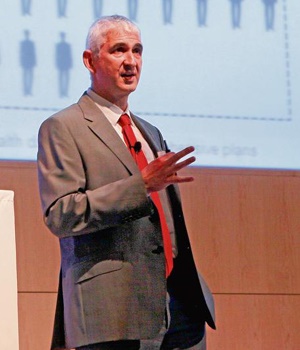
The next time your doctor admits you to a private hospital, make sure you really need to be there – because the longer you stay, the more your medical aid premiums will increase.
This is what Discovery Health CEO Jonathan Broomberg suggested to the Competition Commission’s health market inquiry into private healthcare this week during his presentation on what is driving up membership costs at the country’s largest medical aid scheme.
In an interview with City Press, Broomberg, the head of the 2.7-million-member scheme, put the blame for costly premiums on private hospitals, inexperienced emergency room doctors who admitted patients for specialists to check the next day, and younger members who only joined schemes when they were about to start families, thus using more funds than they contributed.
He insisted that price inflation on healthcare services and products was not the problem; rather, it was medical scheme members who overused services.
“In our environment, tariffs have been tracking the consumer price index closely. The problem is utilisation of services, which has been increasing by between 4% and 5% above inflation each year,” said Broomberg.
Last year City Press reported that medical aid contributions had increased at a pace 50% higher than the inflation rate between 2005 and 2014. In 2014, for instance, the inflation rate was 6.1%, but medical aid schemes (including Discovery Health) increased their premiums by at least 9%.
Broomberg said the premium increases were due to patients being admitted to private hospitals more often, costing medical schemes R46.4 billion in 2014 alone.
City Press put Broomberg’s views to the Hospital Association of SA (Hasa), which represents the private hospital industry. “Hasa is, unfortunately, unable to respond to your query accurately as the association is not involved in the operations and business of its members.” It will present its case before the inquiry next week.
Broomberg told City Press the increased admission rate to private hospitals had “forced medical schemes to increase premiums to cover the increasing claims coming in”.
“Schemes have to balance the books because, if they don’t, they will have to start drawing down on their reserves,” he said.
Broomberg said the increased use of medical services was driven by demand and supply.
“What we have seen is that young people drop out of medical schemes as soon as their parents stop paying for them. They return later when they are about to start a family, needing to claim more than they are contributing,” he said.
On the supply side, he said the schemes’ greatest concern was doctors admitting patients to hospital unnecessarily.
“Most private hospitals operate emergency rooms. And because of the structure of our regulatory environment, which does not allow hospitals to employ doctors, hospitals are not in a position to employ highly skilled physicians and emergency room doctors. This service gets outsourced to casualty general practitioners, many of whom do not have sufficient experience to assess complex patients.
“We are finding an increasing pattern where young, recently qualified locum doctors are doing after-hours work in casualty and, typically, for anyone who arrives with anything even vaguely complex, the casualty officer will phone a specialist.
“The specialist then advises that the patient be admitted to be seen in the morning.”
Dr Mzukisi Grootboom, chairperson of the SA Medical Association, acknowledged instances of doctors admitting patients overnight, only for them to be discharged the following day, but said “this is part of observation and the decision is often taken to protect the patient and the doctor”.
Broomberg said that in some of the newer hospitals, doctors were direct shareholders and increasing admissions was in their interest.
“Anecdotal evidence suggests that the incentive payment for some hospital managers is linked to volumes, so there is pressure on the doctors working at these hospitals to ensure there is an adequate volume of admissions. I have heard this personally dozens of times in the years I have been in the industry, from people who have worked in hospitals.”
However, he was reluctant to elaborate: “There are some financial relationships between hospitals and doctors, but our concern is that we only have anecdotal evidence on this. What we have seen is that when a new hospital opens in an area where there are already existing hospitals, admission rates usually increase overall in the region.
“In the Western Cape, for instance, four new hospitals were opened in one year and we immediately saw a 3% increase in admission rates. What this suggests is that the demand is flexible and not fixed on the diseases burden, but induced by suppliers.”
Grootboom challenged Broomberg to report such activities: “No doctor would admit a patient unnecessarily just because they want to increase the bed-occupancy rate. Insinuating that private doctors are in cahoots with hospital managers is highly problematic.”
IN 2014 THE INFLATION RATE WAS 6.1% BUT MEDICAL AID SCHEMES INCREASED THEIR PREMIUMS BY
9%
AND BROOMBERG ATTRIBUTED THIS TO PATIENTS WHO WERE BEING ADMITTED TO PRIVATE HOSPITALS MORE THAN EVER BEFORE, COSTING MEDICAL SCHEMES
R46.4bn
IN 2014 ALONE
TALK TO US
Do you think there is any validity to Broomberg’s claims? Or is the problem of medical aid premium increases bigger than that?
SMS us on 35697 using the keyword AID and tell us what you think. Please include your name and province. SMSes cost R1.50
*Headline has been changed since first published




 Publications
Publications
 Partners
Partners








